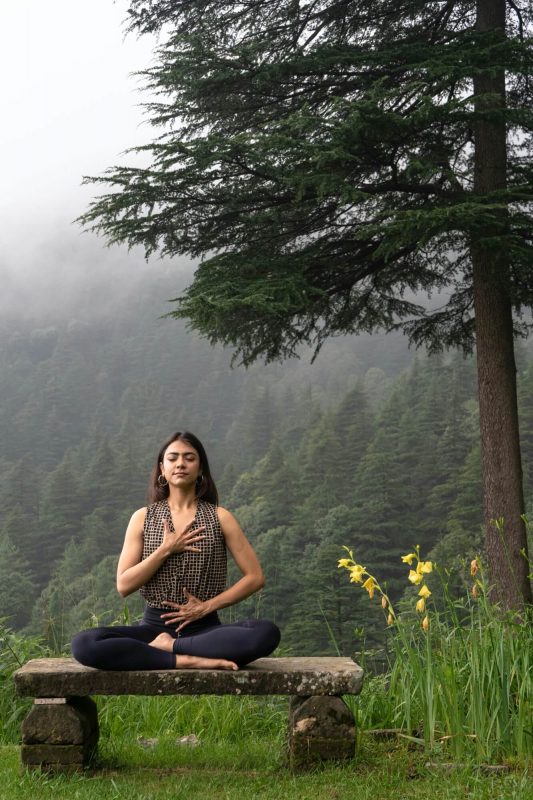Words by Tracey Ellis (travel journalist & freelance writer) – www.traceylynnellis.com
Mind racing, thoughts jumbled, always distracted – do you feel the need to look for silence in our busy world?
In our mad world, how often do you really hear nothing at all? The runway of our mind is not often clear, nor with only one idea taking off at a time. More frequently, our chaotic world is full of thoughts, noises, and distractions crashing into one another, causing stress, sleeplessness, and anxiety as we try to cope with the constant buzz of daily life. Headphones can block out the noise, briefly, or just add more with music, podcasts, or audiobooks blasting in our ears. Pure silence, today, truly is a luxury.
The human brain is not a simple thing. It is a complex network of thoughts, ideas, and feelings that connect to all these different avenues of expression; verbal, emotional, and physical. It is incredible how much it can absorb at once, yet it is not always released. Is this harmful to ourselves? Do we need a brain break from the noise, the chaos, the mechanical workings of our mind that can play havoc with our mental health?
There are far-reaching benefits of being surrounded by silence and engaging only in our own presence; mindfully aware yet peacefully oblivious. Some say it is only then we can become aware of the present moment, with inner reflection and outer abandonment. Many insist that episodes of silence are not only blissful but necessary, as it allows us to shut out the rest of the world and mentally realign.
Sometimes we need to pause, block out all the external noises and silence the internal ones, (that voice in your head that keeps shouting at you, reminding you, doubting you). Many people find this extremely difficult to do. Sometimes it requires complete escape from your daily life to feel the benefits of pure silence. Does that even seem possible? If you go on a silent retreat, it is.
Quiet your Mental Activity
More than meditation, yoga, and silent walks in the woods, a silence retreat provides a journey to inner peace like no other. It can be viewed as a ‘quiet holiday’ or an opportunity for deeper self-discovery, it can be an introduction to meditation or a focus on overall ‘wellness’. It can be whatever you want it to be, as long as it’s silent, reflective, and peaceful. Just as our body needs a detox occasionally, so does the mind.
Don’t Fear the Silence
Many people find the thought of a silent retreat a bit frightening; the idea of being all alone and without distractions could force them to relive hurts, rethink decisions, and review life on the deepest analytical scale. But it doesn’t have to be so daunting. There may be some painful moments of realisation, but when you resurface you have the ultimate freedom that everyone craves – the feeling that you are in control of your life, and that is incredibly liberating.
Medical Benefits
Science also says silence is good for us. Researchers have noticed the power of silence, how it can calm our bodies, enhance our inner thoughts, and help us to connect better with the world. There are correlations with high blood pressure and loud, constant noise sources like highways and airports which can lead to increased rates of insomnia, tinnitus, heart disease, and high blood pressure. People who are surrounded by a constant loud noise often experience high levels of stress hormones. More specifically, silence can improve memory, relieve stress, fight insomnia, heighten sensitivity, and stimulate brain growth. This makes it a positive option for those fighting depression and Alzheimer’s, as prolongedperiods of silence can lead to the development of new cells in the brain region associated with memory, learning and emotion.
Reconnect with Mother Nature
Who doesn’t revel in the quiet sounds of nature? Enchanting birdsong, the ocean’s rush, bees buzzing – the subtler tones of nature provide a peaceful harmony that’s therapeutic and connects us with the natural world rather than the concrete one. Many silence retreats offer natural and peaceful havens in which to practise this introspective process, as it’s been proven that sunshine, fresh air, and oxygen-giving greenery help to boost the immune system and lower blood pressure.
The Art of Nothing
To encompass sheer nothingness requires focus and discipline, which is where a silence retreat comes in, providing a perfect, distraction-free environment in which to calm the mind and realign your thoughts. Leo Babatua, author of The Power of Less, says that it’s best to start small, as doing ‘too much nothing at once can be overwhelming.’ He says it’s good practice to just try breathing deeply and slowly to help you get to a quiet state more easily. Then embrace complete relaxation – try tensing each muscle and then releasing it to remind you of that relaxed feeling.
Emotional Rollercoaster
With all the emotions you’re bound to experience over a long period of silence, you must remember that they’ll fade and wash over you, so take this time to step back and observe it from a neutral position. Most retreats have support systems in place if you feel overwhelmed with emotions from the experience.
Silent Eating
Being mindful of how you eat is integral to all silence retreats. Many places customise meals with specially prepared ingredients that are designed specifically to calm the mind and are easy to digest. The food is ensured to keep you balanced as much as the quiet activities, and of course how you eat is just as important as what you eat. When eating in complete silence, the sensations of biting and chewing all of a sudden become revelatory. Scientific studies prove that if we ate more mindfully we’d become more aware of our food, have better digestion, and probably lose weight.
How Long?
There is no set rule for how long one should remain in silence; the fact is, any amount of time is beneficial. If taking a few days to detox your mind is too much, try just five minutes a day. Clinical psychologist Elisha Goldstein conducted a national research study in the US and found that even this short amount of time had significant effects on stress and well-being. He says we should ‘balance the busyness’ by spending time in solitude. He sees it as an act of ‘self-compassion’ to give our minds at least five minutes a day of silence.
After the Silence
Most people feel emotionally cleansed after a silent retreat. Initial exhaustion is soon replaced by calmness and positive sensitivity to the world around you. You may be able to step away from yourself more easily and just observe with more understanding than before. Silence retreats offer a place to explore a degree of solitude, to distance ourselves from the complexity of personal interaction which can cloud our insight into experiencing life directly, and encourage you to find power in the silence, rather than fearing it.
If someone is naturally accomplishment-oriented and active in life, then it may feel strange when the music stops. Yet the quiet sounds of life’s simple pleasures – a sip of tea, book pages turning, deep breathing or slow walking – are more meaningful when surrounded by silence, and afterwards. Indulge in them, revel in the powerful sound of silence and see what happens in the quiet, reflective aftermath.

Tips to Silence Success
Your first attempt at silence might seem overwhelming, but these four steps will guide you along to quiet fulfilment.
1) Resist the urge to touch – as soon as we sit in silence it seems we get an itch, pain or some other discomfort. It’s our body trying to distract us from silent focus, so try to ignore it as best you can (without being in pain!). In most cases the discomfort passes or the urge lessens, and you will be rewarded with a higher tolerance of discomfort in everyday situations to make you stronger.
2) Make your head spacious, allow your mind to breathe. Then let this deeply-felt openness creep down to your heart and the rest of your body. Feel yourself opening up to an awareness of not only what’s around you but what’s inside.
3) Allow heavy sensations to dissolve from your body to help sharpen your awareness. As your chaotic thoughts and emotions churn in your head, you may feel sensations in your body in the form of tingles and small pains. Try not to react to them, but just observe them. Don’t be alarmed by how your whole body reacts to silence!
4) Breathing is an integral part of a successful silence retreat. Meditation experts say to breathe in through the nose and out through the mouth, slowly and deeply. If you find your mind wandering, try counting the seconds as you breathe in, hold the breath, then exhale.
Which Silence Suits You?
Green Silence – Bali
Bali Silent Retreat embraces a new food philosophy called BumiBari (New Earth) which acknowledges the increasing decline of health on our planet, global warming, and chronic illness by creating dishes with organic food fresh from the earth. With labyrinth walking meditation, hot springs, and its own medicine garden, you are immersed in this ‘green to the extreme’ eco-sanctuary for the ultimate natural experience.
https://www.balisilentretreat.com/
Rambling Silence – East Sussex
Retreat to Gayle’s in the South Downs with walking, yoga, meditation and silence. The practice uses these four components to interconnect holistically, with each one preparing you for the next; the idea is that experiencing the rhythm of walking in silence along an iconic landscape will help prepare for deeper work in meditation and yoga.
https://www.retreattogayles.co.uk/
Serious Silence – Devon
Gaia House, whilst quite strict about their silence during retreat time (no verbal or written communication at all with the outside world), they also offer a less silent alternative at The Barn, a meditative retreat centre nearby where small groups practice mindfulness and meditation alongside teacher-led Buddhist inquiry and ‘working’ meditation in the organic garden.
http://gaiahouse.co.uk/
Dark Silence – Poland
The Ultimate Darkness Retreat incorporates darkness with silence, a potentially overwhelming but powerful combination. This unique retreat offers therapeutic support, meditation, and other healing practices to foster inner peace, self-awareness, and personal transformation. Devoid of distractions, it is meant to harness a different, unexplored side of yourself whilst staying in a completely dark, luxury cabin, with meals brought to you (light switches are an option). For those adventurous minds with no fear of the dark.
https://theultimatedarknessretreat.com/
Flexible Silence – India – A Boutique Resort and Luxury Ashram
Shreya’s Retreat includes personalised Pranyama, Trakata (Candle meditation), Yoga Nidra (deep relaxation), and massage sessions. Also daily walking meditation and nature based activities, vegetarian meals, and use of all facilities (swimming pool, jacuzzi, steam, gym).
Silence can be broken to speak to staff, and optional non-silent activities are available.
http://www.shreyasretreat.com/silent-retreat.htm
Soul Silence – Sardinia
Soul Valley is nestled in a small valley with views of the Mediterranean sea and offers the chance to reconnect with your soul with a seven day silent retreat that includes yoga, breath work, and self-knowledge activities. The focus is more on self-inquiry, and how to maintain this soul state of being when back in daily life.
https://soulvalley.com/retreats/silent-retreat-spring/
Detox Silence – Italy
An all-round gentle, relaxed, and transformative seven-day retreat at the foot of the Italian Alps, consisting of nourishing, medicinal food, massages, spa, and yoga.
https://mandali.org/retreats/specific/?id=2195

